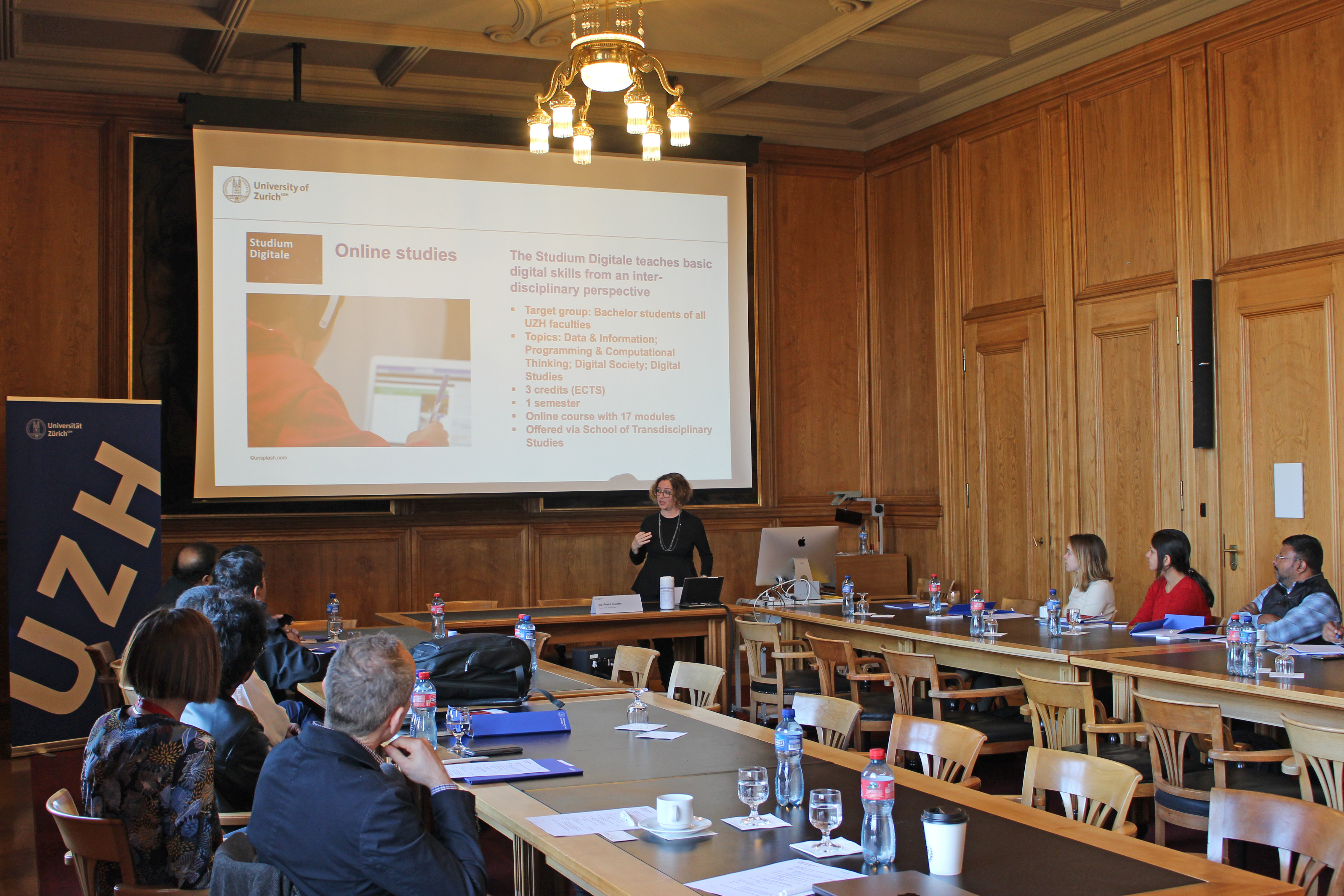Fostering Exchange on Digitalization: Indian Journalists and Academic Policy Makers Visit UZH
Digital governance, digital self-determination and digital health: Indian media representatives and academic policy makers visited UZH to learn more about UZH's Digital Society Initiative.

The Power of a Transdisciplinary Approach
Digitalization and its impact on societies is intensively being researched and discussed across faculties at the UZH. This common interest led to the establishment of the Digital Society Initiative (DSI), the university-wide competence center on digitalization and digital transformation. The DSI promotes research and teaching, engages in regular discourse with the public and supports policy-making on digital transformation issues.
In her presentation, Prof. Claudia M. Witt, co-director of the DSI, highlighted: “Digital transformation affects all areas of society. Therefore, we are breaking down the silos between disciplines by taking a transdisciplinary approach to shape the digital future”.
Along with the Swiss-Indian bilateral focus area of digitalization, UZH presented recent research projects in the field of digital self-determination, digital governance and digital health.
Digital Self-Determination: How Much Regulation Do We Need?
Digital self-determination explores how the potential of data can be realized for society and the economy without hampering individual rights. Algorithmic systems have a growing influence on private and public life, infrastructures for algorithmic systems are increasingly being created in Switzerland and abroad, and the regulation of these systems becomes a key topic.
As co-author of the position paper of the DSI on a regulatory framework for artificial intelligence, Prof. Karsten Donnay presented the approaches that should be taken to the legal coverage of algorithmic systems in Switzerland and how the country could position itself in the context of European regulatory trends. According to Donnay, regulation of artificial intelligence aims at protecting individuals and society from disadvantages due to algorithmic systems. Considering their complexity, these regulatory decisions should be based on cross-disciplinary scientific expertise.
Digital Governance: Vulnerability to Cyber Threats Increases
The role of digital governance was discussed based on the topic of cybersecurity: How can we better protect ourselves from cyber threats? Answering this question requires finding the proper balance between technological possibilities and political, social, and economic interests.
Particularly challenging is the increasing digitalization of critical infrastructures. While it has clear benefits, it brings with it a greater vulnerability to cyber threats, for example the possibility of large-scale incidents that could impact the steady supply of electricity, clean drinking water, food, or medicine. Dr. Melanie Knieps explained how the project CYRENZH (Cyber Resilience Network For the Canton Of Zurich) aims at protecting Zurich’s economy and society through research and teaching initiatives as well as the establishment of a task force of civilian first responders.
Digital Health: Creating a Cross-Institutional Digital Ecosystem
Prof. Michael Krauthammer presented Digital Health Zurich, a lab in which digital health solutions in the hospital context are being investigated and implemented with practical relevance. Core topics include remote monitoring, integrated care and related technologies as well as empowerment of patients and staff. The goal is to establish a sustainable, data-driven and cross-institutional digital ecosystem by connecting patients, health professionals, technology and research in Zurich and beyond.
Digitalization As a Global Challenge
Whether it is digital health, digital governance or digital self-determination, both the Indian and UZH participants agreed that in order to ensure a positive impact on societies and economies, digitalization should not only be discussed on a national, but on an international level. In this context, universities play an essential part by increasing objective knowledge, fostering innovation, and transferring it to governments and the public.
Viviane Gao
